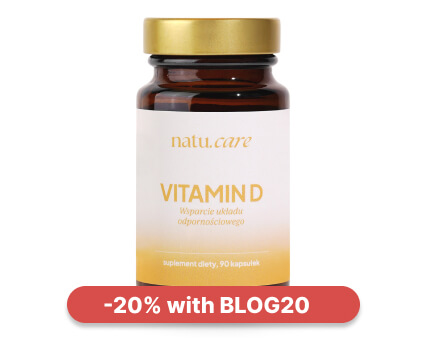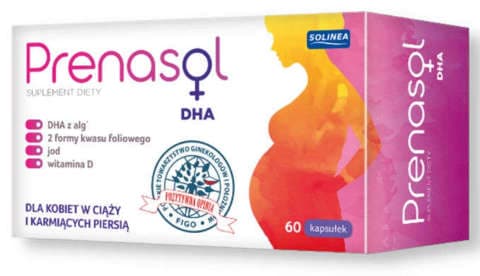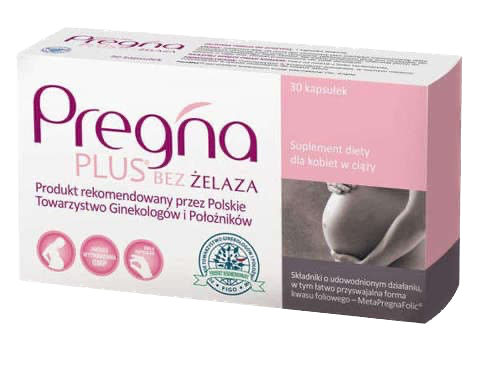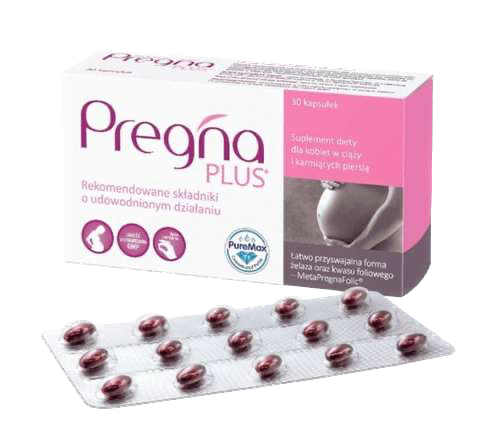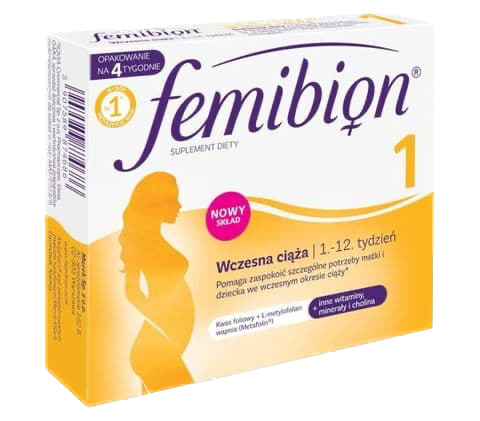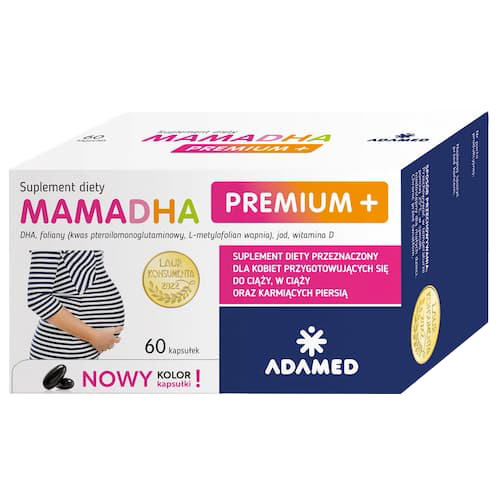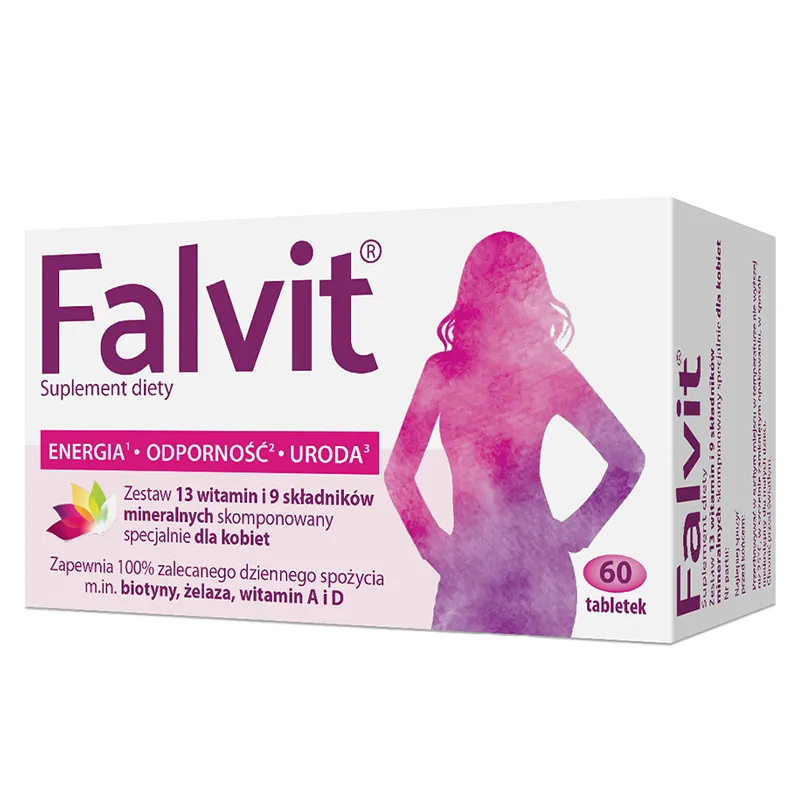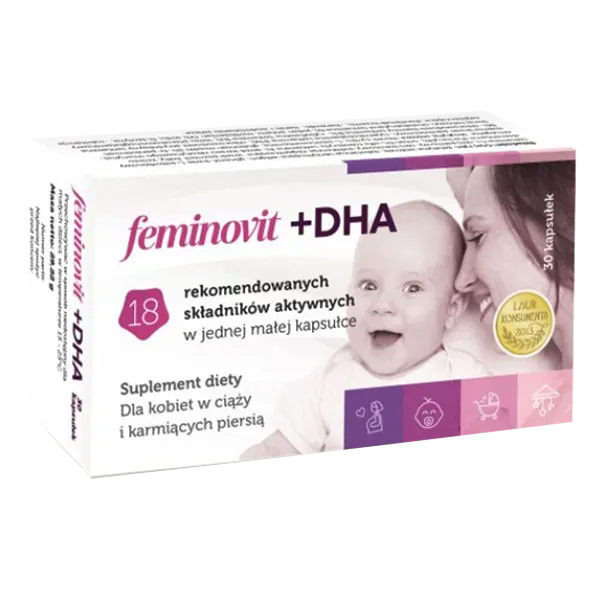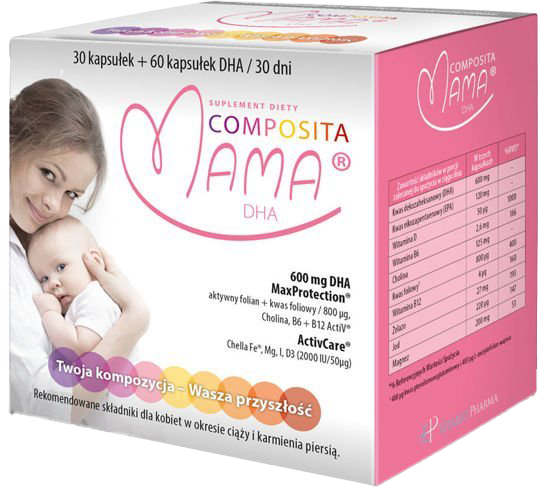The best vitamins for pregnant women - Ranking and expert opinions
We have collected the best vitamins for pregnant women for you. Check out the ranking and choose wisely.


Learn more about our editorial process
.

Learn more about our editorial process
.

Learn more about our editorial process
.

Learn more about our editorial process
.
Why you can trust us
Articles on Natu.Care are written based on scientific research, data from government websites and other reliable sources. The texts are written in cooperation with doctors, nutritionists and other health and beauty experts. Articles are reviewed before publication and during significant updates.
.Learn more about our editorial process
.Information about advertisements
Content on Natu.Care may contain links to products from the sale of which we may receive a commission. When creating content, we adhere to high editorial standards and take care to be objective about the products discussed. The presence of affiliate links is not dictated by our partners, and we select the products we review ourselves completely independently.
.Learn more about our terms and Conditions
.Choosing which supplements to take during pregnancy is a big decision - after all, you want the best for your baby. There are things you must supplement like folic acid. But what about the rest?
New products are appearing all the time. The adverts tempt you. But are they really good vitamins for pregnant women? What about their safety and effectiveness? And are they needed at all?"
.
With educator and Master of Pharmacy Ilona Krzak, we will help you choose the best vitamins for pregnant women. Read this post carefully and you will be able to judge for yourself whether the product someone is praising is in line with the current standards for our country.
From this article you will learn:
- What vitamins and micronutrients you need to supplement during pregnancy. .
- What supplements for pregnant women are recommended by experts.
- What to look out for during pregnancy.
- What to look out for when choosing vitamins for pregnant women. .
- When to start supplementation and how long it should last. .
- Whether there are dangerous vitamins for mothers-to-be and breastfeeding women.
- Whether there are dangerous vitamins for mothers-to-be and breastfeeding women.

Zobacz, co dla Twojego zdrowia może zrobić Natu.Care Witamina D 2000 IU. -15% z kodem BLOG15
Natu.Care Witamina D 2000 IU
Natu.Care Witamina D 2000 IU wspiera prawidłowe działanie układu odpornościowego, utrzymanie zdrowych kości i zębów oraz utrzymanie prawidłowych funkcji serca, nerek i układu mięśniowego.
Sprawdź cenę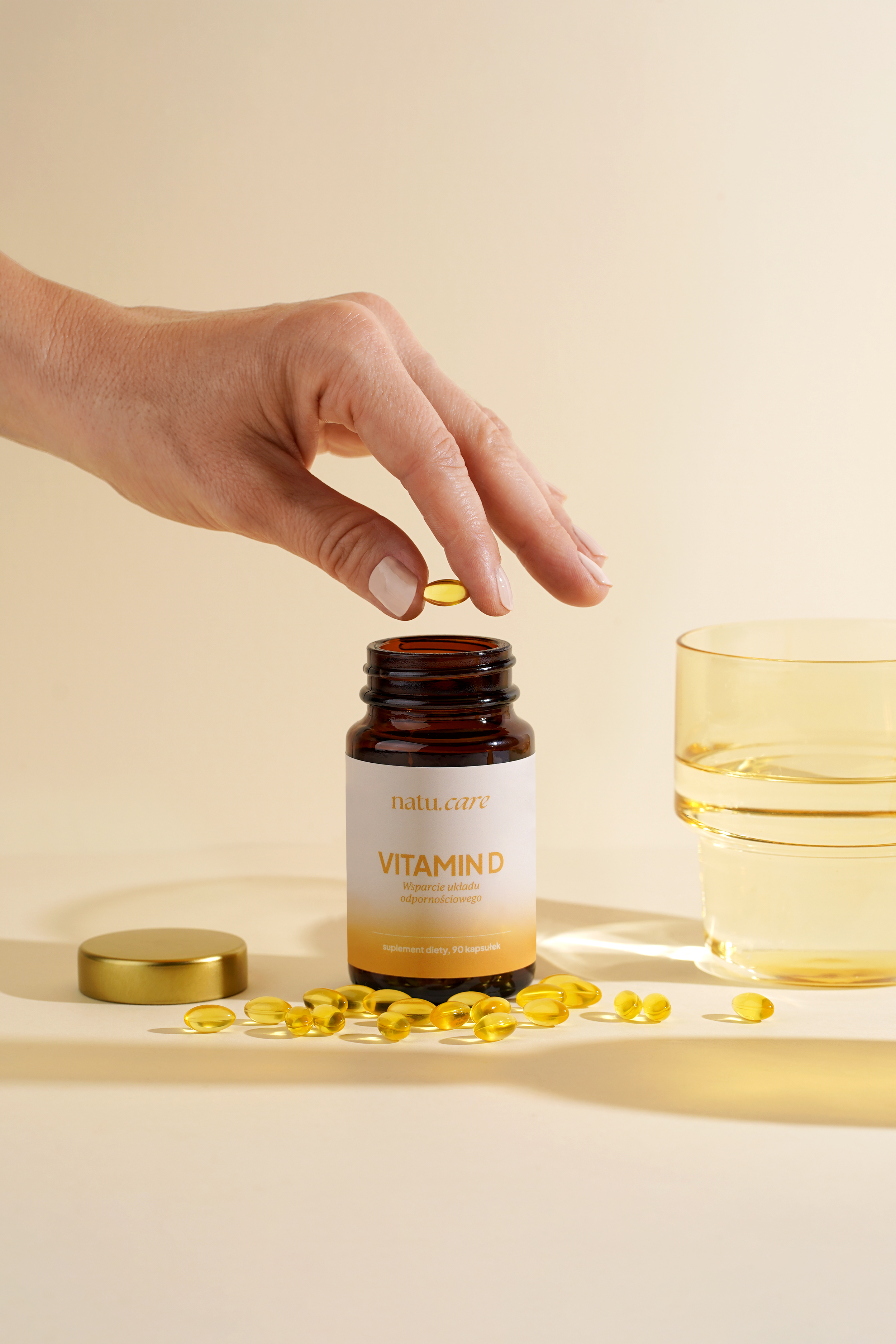
Świetny produkt, tabletki są małe i wygodne do połknięcia. Plus za wysoką jakość!Joanna
See also:
.
Let's start with the guidance from the Polish Society of Gynaecologists and Obstetricians (PTGiP) on which vitamins to supplement during pregnancy...
Best vitamins for pregnant women
.
The risk of deficiencies may affect up to 64% of Polish women. Only 36% of pregnant Polish women follow a balanced diet, and just over half eat regularlyand.
The Polish Society of Gynaecologists and Obstetricians (PTGiP) recommends that folic acid (folate), iodine, vitamin D and DHA acid should be supplemented during pregnancy. In the event of a deficiency, iron is also recommended.
The following are the 11 best vitamins for pregnant women - with folic acid, DHA, iodine and vitamin D:
- Prenasol
- Pregna Plus without iron .
- Pregna Plus .
- Femibion 1 - early pregnancy .
- Ferisan Pregna .
- MAMADHA Premium Plus .
- FALVIT Mama .
- Feminovit + DHA .
- Symvital Mama .
- OLIMP Gold-Vit Mama .
- Composita Mama DHA .
Choice criteria:
- Content of active ingredients. Must have the main ingredients recommended by the Polish Society of Gynaecologists and Obstetricians (PTGiP), preferably in the correct doses and in the best bioavailable forms.
- Compounds.
- Composition. We say a definite no to unnecessary colours and sweeteners. We are not afraid of long compositions, as long as they are necessary and valuable.
- Price. Cheaper and better? Yes, it can be done.
Learn about the best vitamin tablets for pregnant women:
.
Natu.Care Vitamin D 2000 UI
Product description
Vitamin D plays a crucial role in our health and well-being. It affects calcium and phosphate metabolism, which translates to healthy bones and teeth. It also helps regulate the immune system, and studies indicate its influence on the functioning of the nervous system.
Vitamin D, although called a “vitamin,” is actually a prohormone that our body produces on its own, primarily under the influence of sunlight. Unfortunately, our modern lifestyle contributes to deficiencies of this essential vitamin. Working in enclosed office buildings, using (necessary!) SPF creams, and covering the body with clothing all make it very difficult, if not impossible, to obtain adequate levels of vitamin D from sunlight. This is why appropriate, year-round supplementation is so crucial.
Vitamin D from Natu.Care is a well-tested vitamin D3 suspended in safflower oil, a plant known for its numerous health benefits. The convenient, easy-to-swallow capsule will make supplementation a part of your daily, healthy routine, improving your overall well-being.
Pros and cons
Pros:
- Ensures proper functioning of the immune system
- Supports the maintenance of healthy bones and teeth
- Maintains proper heart, kidney, and muscle function
- Tested by an independent, certified laboratory
- Convenient and easy-to-swallow capsule
- Clean composition - free from added sugar, gluten, GMOs, lactose, and without preservatives or colorants
Cons:
- None.
Additional Information
Pregnant women and breastfeeding mothers should consult a doctor before using the product. This dietary supplement is intended for a healthy adult population up to the age of 75.
Product description
Product recommended for pregnant and breastfeeding women as a supplement to the daily diet of DHA acid, iodine, vitamin D and folate.
Pros and cons
Product recommended for pregnant and breastfeeding women as a supplement to the daily diet of DHA acid, iodine, vitamin D and folate.
Additional information
Product recommended for pregnant and breastfeeding women as a supplement to the daily diet of DHA acid, iodine, vitamin D and folate.
Expert opinion
Product recommended for pregnant and breastfeeding women as a supplement to the daily diet of DHA acid, iodine, vitamin D and folate.
Product description
Pregna Plus without iron is a composition of ingredientsós important for pregnant women and the developing baby. Among others, it contains folic acid, vitamin D, iodine and DHA acid.
Pros and cons
Pregna Plus without iron is a composition of ingredientsós important for pregnant women and the developing baby. Among others, it contains folic acid, vitamin D, iodine and DHA acid.
Additional information
Pregna Plus without iron is a composition of ingredientsós important for pregnant women and the developing baby. Among others, it contains folic acid, vitamin D, iodine and DHA acid.
Expert opinion
Product description
Pregna Plus is a specially selected set of ingredientsós needed by pregnant women and breastfeeding mothers. It contains ingredients such as folic acid, zinc, iodine, iron, vitamin B6, omega-3 acids (DHA, EPA) and vitamin B12.
Pros and cons
Pregna Plus is a specially selected set of ingredientsós needed by pregnant women and breastfeeding mothers. It contains ingredients such as folic acid, zinc, iodine, iron, vitamin B6, omega-3 acids (DHA, EPA) and vitamin B12.
Additional information
Pregna Plus is a specially selected set of ingredientsós needed by pregnant women and breastfeeding mothers. It contains ingredients such as folic acid, zinc, iodine, iron, vitamin B6, omega-3 acids (DHA, EPA) and vitamin B12.
Product description
A dietary supplement for women in the first trimester of pregnancy. Contains folate, iodine, selenium, iron, choline, as well as B vitamins, vitamin E and vitamin D and C.
Pros and cons
A dietary supplement for women in the first trimester of pregnancy. Contains folate, iodine, selenium, iron, choline, as well as B vitamins, vitamin E and vitamin D and C.
Additional information
A dietary supplement for women in the first trimester of pregnancy. Contains folate, iodine, selenium, iron, choline, as well as B vitamins, vitamin E and vitamin D and C.
Product description
Dietary supplement for women planning pregnancy, pregnant and breastfeeding. The ingredients include fish oil as a source of DHA and EPA, magnesium, iodine, folic acid and vitamin D.
Pros and cons
Dietary supplement for women planning pregnancy, pregnant and breastfeeding. The ingredients include fish oil as a source of DHA and EPA, magnesium, iodine, folic acid and vitamin D.
Additional information
Dietary supplement for women planning pregnancy, pregnant and breastfeeding. The ingredients include fish oil as a source of DHA and EPA, magnesium, iodine, folic acid and vitamin D.
Product description
Product intended for pregnant and breastfeeding women. It helps supplement the daily diet with, among others, folate, iodine, calcium, iron, vitamin D, zinc, vitamin E, copper or selenium.
Pros and cons
Product intended for pregnant and breastfeeding women. It helps supplement the daily diet with, among others, folate, iodine, calcium, iron, vitamin D, zinc, vitamin E, copper or selenium.
Additional information
Product intended for pregnant and breastfeeding women. It helps supplement the daily diet with, among others, folate, iodine, calcium, iron, vitamin D, zinc, vitamin E, copper or selenium.
Product description
A dietary supplement for pregnant and breastfeeding women. Contains a composition of ingredients needed during this time, including omega-3 fatty acids, folic acid, iron, iodine, vitamin D and B vitamins.
Pros and cons
A dietary supplement for pregnant and breastfeeding women. Contains a composition of ingredients needed during this time, including omega-3 fatty acids, folic acid, iron, iodine, vitamin D and B vitamins.
Composita Mama DHA
Product description
A dietary supplement for pregnant women thatós composed of two – vitamin and mineral capsules and containing DHA and EPA. The formulation includes magnesium, choline, vitamin D, folate, potassium and vitamin B12.
.Pros and cons
A dietary supplement for pregnant women thatós composed of two – vitamin and mineral capsules and containing DHA and EPA. The formulation includes magnesium, choline, vitamin D, folate, potassium and vitamin B12.
.Additional information
A dietary supplement for pregnant women thatós composed of two – vitamin and mineral capsules and containing DHA and EPA. The formulation includes magnesium, choline, vitamin D, folate, potassium and vitamin B12.
.{product:3H8oFSZ8o32afH9NqADh7N }}
See also:
.
Why is supplementation during pregnancy so important?
.
It is commonly assumed that a pregnant woman eats for two. This is not entirely true. A well laid out and balanced diet during pregnancy should be for two (or three or four when multiple pregnancies are involved). Yes, the macronutrient requirements (carbohydrates, protein, fat) increase, but on average by around 285 caloriesand. Far more important is the increase in micronutrient requirements, i.e. vitamins and minerals (including trace minerals).
Supplementation during pregnancy is necessary for several reasons:
.
- prevention of nutritional deficiencies - can lead to dangerous birth defects; .
- multiple pregnancies - if you are carrying more than one baby under your heart, you need even more nutrients; .
- non-nutrition - it is often the case that mothers-to-be forget about their own well-being, do not eat regularly or reach for products that are poor in valuable nutrients. Supplementation can help eliminate the risk of malnutrition and the consequences associated with it; .
- providing the child with the right conditions for development; .
- Genetic mutations - women with a mutation in the MTHFR gene need the methylated form of folic acid. Taking usual folic acid, which is often found in pregnancy vitamins, can lead to severe complications.
Supplementation with 5-methyltetrahydrofolate (or another methylated form of folic acid) during pregnancy is more recommended than traditional folic acid because of the MTHFR gene mutation. When it is present, regular folic acid is not completely metabolised, leading to its accumulation in the body, and excess is harmful..
 .
.
Ilona Krzak Master of Pharmacy
.
What vitamins and minerals to supplement during pregnancy? Guidelines from the Polish Society of Gynaecologists and Obstetricians
.
The primary source of vitamins and micronutrients should be a well balanced diet for pregnant women. However, there are ingredients that are important for you and your baby that you need to take special care of, and diet alone may not be enough when the need for them increases.
The Polish Society of Gynaecologists and Obstetricians (PTGiP), based on the latest research and civilisation changes, publishes its recommendations for supplementation in pregnant women every few yearsand. The latest recommendations are from 2020 and include 5 ingredients:
- Folic acid, .
- DHA, .
- iodine, .
- vitamin D, .
- iron, .
Folic acid in pregnancy
.
Folic acid (folate) plays an important role in preventing neural tube defects, which can lead to miscarriage, infant mortality and severe disabilityand. In addition, it is important for normal infant growth, DNA formation and brain development, contributes to maternal tissue growth, helps with amino acid synthesis and supports blood production, and contributes to reducing feelings of fatigue or tiredness.
PTGiP recommends folic acid supplementation in the following doses:
.
- .
- 0.4 mg in women of childbearing age; .
- 0.4-0.8 mg in the first trimester of pregnancy; .
- 0.6-0.8 mg after the 12th week of pregnancy and during lactation; .
- in women with a positive history of neural tube defects (NTDs) 4 mg at least 4 weeks before planned pregnancy and up to the 12th week of pregnancy, then 0.6-0.8 mg until the end of pregnancy; .
- 0.8 mg at least 3 months before planned conception and throughout pregnancy and lactation in women at increased risk of folate deficiency and neural tube defects; .
This group includes women:
.
- who have type I or type II diabetes;
- who have type I or type II diabetes.
- users of antiepileptic drugs, as well as metformin, cholestyramine, methotrexate, sulfadiazine; .
- users of stimulants; - users of drugs
- suffering from hepatic or renal failure; .
- with a BMI greater than 30; .
- after bariatric surgery; .
- with diseases manifesting themselves in malabsorption (e.g. Crohn's disease, coeliac disease); .
See also:
.
DHA in pregnancy
.
Docosahexaenoic acid, or DHA is one of the omega-3 acids. An adequate amount of DHA is necessary, among other things, for the proper development of a child's nervous system and also ensures better visual acuity. In addition, studies show that it prevents postnatal depressionand.
PTGiP recommends:
.
- .
- supplementation with DHA at a dose of at least 200 mg in all pregnant women; .
- increasing DHA intake in women consuming small amounts of fish; .
- in a group of women at risk of preterm birth, the use of DHA at a dose of 1000 mg per day; .
An excellent source of omega-3 fatty acids, including DHA, is fish. Sometimes mothers-to-be are afraid to eat fish for fear of potential ingestion of heavy metals, mercury or harmful microorganisms. Such risks theoretically exist, but in practice are minimal.
The National Centre for Nutrition Education does not recommend that mums-to-be eat raw meat and fishand, but as much as possible you can eat heat-treated fish - choose fresh and quality. In short - sushi no, stewed fish yes.
.
important
Iron supplementation is not necessary if follow-up test results are within reference standards.
See also:
.
- DHA acid - sources and properties .
- Tran - action and dosage .
- Omega-3 fatty acid deficiency
- Omega-3 in tablets
- Omega acids .
Iodine in pregnancy
.
Iodine is a micronutrient essential for the synthesis of thyroid hormones, which regulate the function of many organs. Deficiency can cause hypothyroidism (in mother and child), damage to the central nervous system, mental retardation, hearing loss and deafness in the newborn. Too little iodine is a greater risk of miscarriage or premature birth.
PTGiP recommends:
- .
- Iodine supplementation in all pregnant women without thyroid disease at a dose of 150-200 µg; .
- for women with known disease, the dose should be adjusted according to the results of thyroid tests. .
See also:
.
Vitamin D in pregnancy
.
Vitamin D, among other things, regulates calcium and phosphorus concentrations, maintains bone mineral density and supports immune system function, as well as supporting muscle, bone and dental health. Adequate levels of vitamin D reduce the risk of pre-eclampsia, severe postpartum haemorrhage, gestational diabetes or low birth weight of the babyand.
PTGiP recommends:
.
- .
- during pregnancy and lactation in women with normal BMI and without burdens suggestive of vitamin D deficiency, supplementation at a dose of 1500-2000 IU per day; .
- Females with a BMI >30 consider a dose of up to 4000 IU per day. .
See also:
.
Iron in pregnancy
.
Iron plays an important role in the production of ferritin and haemoglobin, is actively involved in tissue respiration, is responsible for the functioning of the brain and immune system, and regulates the nervous systemand.
PTGiP recommends:
.
- .
- regular monitoring of morphology and ferritin levels; .
- iron supplementation before the 16th week of pregnancy for women with known anaemia (anemia) due to iron deficiency;
- after the 16th week, iron supplementation at a dose of 30 mg per day (as long as the ferritin concentration has fallen below 60 µg/l.
And magnesium in pregnancy?
.
The Polish Society of Gynaecologists and Obstetricians does not currently include magnesium in its recommendations.
See also:
.
Finally, here's another short quote from the Recommendations, which we hope will make you not even think about taking vitamins on your own "just in case": "The presence of other micronutrients, vitamins and active substances, in supplementation, i.e. supplementation of the normal diet, is not recommended unless there is a specific medical indication to do so." So the verdict is clear - supplement what you actually need.
When to start taking vitamins during pregnancy?
.
Pregnancy and the birth of a baby is a special time for which you need to prepare accordingly. A layette, cot, pram and new room are one thing. The mum-to-be should also prepare her body.
Although there are no clear-cut recommendations, many doctors advise that, before starting to prepare for the baby, detailed diagnostic tests should be carried out - especially thyroid hormone tests and determination of vitamin and mineral concentrations - and supplementation should be started under medical supervision. The test results will tell you what components are normal and what needs to be supplemented. It is best to do this about three months before the planned pregnancy, and it is worth starting folic acid supplementation even earlier, as much as six months before.
Research shows that...
.Inositol supplementation improves fertility in women with polycystic ovary syndrome and increases their chances of conceivingand.
Vitamin A, D and B12 are key micronutrients for pregnant women and the foetus, so it is worth ensuring an adequate supply of these even before you start trying for a baby .
.
What vitamins and minerals should not be taken during pregnancy?
.
Vitamins and micronutrients are necessary for the normal course of pregnancy, the health of the mother and the development of the baby. However, it can be harmful to take them in excess, which is why supplementation should always be done under medical supervision.
Detrimental to mothers-to-be and their babies in excessive amounts may beand:
- vitamin A - can cause birth defects in the baby, hydrocephalus, premature birth and even death of the baby;
- vitamin E - can cause headaches and visual disturbances;
- zinc - although supplementation during pregnancy improves vitamin A levels in mums and babies, excessive intake can lead to toxicity; .
- vitamin C - long-term consumption of high doses of vitamin C increases levels of ascorbate (an enzyme that breaks down vitamin C), which can lead to a deficiency of this vitamin in the baby after birth.
What to look out for when choosing vitamins for pregnant women?
.
Pregnancy supplements are a bottomless pit on the market. New products are developed every year, so, when choosing the one and only, make sure it is safe and the doses of the individual ingredients meet your needs.
Supplements vary in composition, quality of raw materials used, bioavailability, efficacy or manufacturing standards. Look for preparations with GMP (Good Manufacturing Practice) standards - in Polish called DPP (Good Production Practice). This certification is a guarantee of the strictest manufacturing procedures and ingredients.
Be sure to look for products with GMP (Good Manufacturing Practice) standards.
The most important criterion, however, will be your needs, which you determine together with your doctor based on your research. Remember to choose products that meet the recommendations of the PTGiP - especially in terms of the dosage levels of individual ingredients. Avoid colourings and unnecessary fillers. The composition should be clean (though not necessarily short).
.
What vitamins do breastfeeding women need?
.
In addition to the ingredients needed during pregnancy, namely iodine (200-500 μg), folic acid (600-800 μg), vitamin D (1500-2000 IU) and omega-3 acids (especially DHA 200-600 mg), during lactation it is still worth supplementing iron (20 mg; especially if on a vegan and vegetarian diet) and calcium (at a dose of 1000-1300 mg per day). This is the position of the Society for Paediatric Gastroenterology, Hepatology and Nutrition.
Before you start, get a check-up:
- .
- check iron and ferritin levels (blood tests for anemia), .
- check vitamin D and calcium levels, .
- perform thyroid tests, .
- conduct gynaecological examinations, breast ultrasound, mammography. .
On the basis of these, together with your doctor, you will choose the right dosage of a set of vitamins for pregnant women. Don't forget to repeat the examinations after some time and adjust the dosage of the supplements anew.
Pregnancy vitamins for pregnant women should be taken together with your doctor.
See also:
Summary
.
In summary
- The primary source of vitamins and minerals for pregnant women should be an adequate diet.
- Polish Society of Gynaecologists and Obstetricians
- The Polish Society of Gynaecologists and Obstetricians (PTGiP) recommends that you should take care of 5 components during pregnancy: folic acid, DHA, iodine, vitamin D and iron.
- Iron supplementation is a good source of vitamins and minerals for pregnant women.
- Iron supplementation is not necessary if your test results are normal. .
- Supplementation of other ingredients should have a medical justification in the form of an identified deficiency. .
- When choosing supplements for pregnant women, it is essential to check the dosages of individual ingredients, which should be in accordance with the recommendations of the PTGiP. .
- Follow your doctor's recommendations and do not take supplements on your own. .
- Incorrect supplementation and taking vitamins in stock can be dangerous for both mother and baby. .
FAQ
.From when to take vitamins in pregnancy?
.Pregnancy vitamin supplementation is best started 3 months before trying for a baby, and folic acid up to 6 months before. Folic acid should be taken by all women of childbearing age.
What are prenatal vitamins?
.Primenatal vitamins are dietary supplements that are intended for women who are pregnant or planning a pregnancy. They contain a set of nutrients, including vitamins and minerals, which are particularly important for fetal development and for maternal health during pregnancy.
Pre-natal vitamins often contain higher doses of folic acid, which is essential for the normal development of the baby's nervous system, as well as other components such as iron, calcium, iodine, vitamin D or omega-3 acids, especially DHA acid.
.Regular use of prenatal vitamins is recommended by gynaecologists already before and during pregnancy.
Can you take prenatal vitamins without being pregnant?
.Yes, you can take pregnancy vitamins if you are not pregnant, however, if you are not deficient in these ingredients, there is no point in doing so as the doses are tailored to the needs of pregnant women. You can start taking them if you are planning or starting to try for a baby. Supplementation should be tailored to your specific needs, so do blood tests beforehand.
How long to take folic acid during pregnancy?
.Folic acid is a good idea to supplement even before you become pregnant, as well as throughout the pregnancy and while breastfeeding.
The Polish Society of Gynaecologists and Obstetriciansand recommends folic acid supplementation of 0.4 mg daily for all women of childbearing age. Up to the 12th week of pregnancy (in the first trimester), this dose should be 0.4-0.8 mg per day, and after the 12th week and throughout lactation at a dose of 0.6-0.8 mg per day.
The best absorbed form of folic acid is folate. You will determine the dosage and supplementation plan with your gynaecologist based on your history and test results.
Folic acid is the best form of folate.
What vitamins for women planning pregnancy should I take?
.Women planning a pregnancy should supplement folic acid, iodine, vitamin D and omega-3 acids, ingredients recommended by the Polish Society of Gynaecologists and Obstetricians (PTGiP). Supplementation with iron is recommended in cases of known deficiencies.
What is the importance of zinc during breastfeeding?
.Zinc is essential for healthy fetal and neonatal development, as well as milk production during lactationand. Zinc is essential for the proper functioning of the immune system, growth and development, as well as nervous system function and brain function. An infant's uptake of zinc from breast milk is approximately 50%, which meets the infant's zinc requirements for the first few months. Zinc deficiency in breastfed infants can occur due to low concentrations of zinc in breast milk, so it is important for mothers to consume sufficient zinc in their diet and to take zinc supplements.
See also: Zinc in tablets - Ranking
.What vitamins are worth investigating during pregnancy?
.The Polish Society of Gynaecologists and Obstetricians, in its recommendations, lists 5 ingredients to pay special attention to during pregnancy:
- folic acid, .
- iodine, .
- DHA acid, .
- vitamin D, .
- iron, .
In addition to these, it is also worth checking the concentration and ensuring an adequate supply of vitamin B6, B12, vitamin A, vitamin K, as well as calcium and zinc.
.What about vitamin B6 in pregnancy?
.Vitamin B6 is crucial for the development of your baby's brain and nervous system, and also reduces pregnancy nausea. The requirement for vitamin B6 during pregnancy increases from 1.3 mg to 1.9 mg per day. Good sources of vitamin B6 include sunflower seeds, liver, potatoes, bananas, kale, chickpeas and nuts.
Can I find vitamins for pregnant women without folic acid?
.Folic acid is one of the main ingredients included in the recommendations of the Polish Society of Gynaecologists and Obstetricians for supplementation during pregnancy. You can take it separately or in vitamin preparations for pregnant women. All dietary supplements for pregnant women contain it. Choose those with the methylated form of folic acid - it is well absorbed, even if you have problems with folic acid metabolism.
Are vitamins for pregnant women in the form of a medicine?
Vitamins for pregnant women are usually dietary supplements. There are single-ingredient preparations available on the market in the form of over-the-counter (OTC) medicines. One of these is Folik.
How much do vitamins cost for pregnant women?
.The price of a monthly treatment of vitamins for pregnant women varies widely in Poland. You can buy the cheapest preparations even for about 15 PLN. You will also find much more expensive supplements. The average price is around 40-45 PLN.
.See also: Multivitamin - for children, women, men and the elderly
..
Resources
.See all
.Analysis of selected aspects of the diet of pregnant women. - UML Publications Bibliography. (n.d.). Retrieved 8 May 2023, from https://bpp.umlub.pl/bpp/rekord/Analiza-wybranych-aspektow-sposobu-odzywiania-kobiet-ciezarnych-Family-Medicine-Primary-Care-Review-Sokolowska-B-Wisniewska-M-Borzecki-A-27-76686/
Aumeistere, L., Ciproviča, I., Zavadska, D., Bavrins, K., & Borisova, A. (2018). Zinc Content in Breast Milk and Its Association with Maternal Diet. Nutrients, 10(10), 1438. https://doi.org/10.3390/nu10101438
Bastos Maia, S., Rolland Souza, A. S., Costa Caminha, M. de F., Lins da Silva, S., Callou Cruz, R. de S. B. L., Carvalho dos Santos, C., & Batista Filho, M. (2019). Vitamin A and Pregnancy: A Narrative Review. Nutrients, 11(3), Article 3. https://doi.org/10.3390/nu11030681
Bestwick, J. P., Huttly, W. J., Morris, J. K., & Wald, N. J. (2014). Prevention of Neural Tube Defects: A Cross-Sectional Study of the Uptake of Folic Acid Supplementation in Nearly Half a Million Women. PLOS ONE, 9(2), e89354. https://doi.org/10.1371/journal.pone.0089354
Black, R. E. (2001). Micronutrients in pregnancy. British Journal of Nutrition, 85(S2), S193-S197. https://doi.org/10.1079/BJN2000314
Brown, K. H., Engle-Stone, R., Krebs, N. F., & Peerson, J. M. (2009). Dietary Intervention Strategies to Enhance Zinc Nutrition: Promotion and Support of Breastfeeding for Infants and Young Children. Food and Nutrition Bulletin, 30(1_suppl1), S144-S171. https://doi.org/10.1177/15648265090301S108
Pregnancy-Folic Acid-Institute of Mother and Child. (n.d.). Retrieved 2 May 2023, from https://imid.med.pl/pl/dla-pacjenta/porod-w-instytucie/ciaza-kwas-foliowy
Committee Opinion No. 495: Vitamin D: Screening and Supplementation During Pregnancy. (2011). Obstetrics & Gynecology, 118(1), 197. https://doi.org/10.1097/AOG.0b013e318227f06b
De-Regil, L. M., Palacios, C., Ansary, A., Kulier, R., & Peña-Rosas, J. P. (2012). Vitamin D supplementation for women during pregnancy. Cochrane Database of Systematic Reviews, 2. https://doi.org/10.1002/14651858.CD008873.pub2
Dijkhuizen, M. A., Wieringa, F. T., West, C. E., & Muhilal. (2004). Zinc plus β-carotene supplementation of pregnant women is superior to β-carotene supplementation alone in improving vitamin A status in both mothers and infants. The American Journal of Clinical Nutrition, 80(5), 1299-1307. https://doi.org/10.1093/ajcn/80.5.1299
Dror, D. K., & Allen, L. H. (2010). Vitamin D inadequacy in pregnancy: Biology, outcomes, and interventions. Nutrition Reviews, 68(8), 465-477. https://doi.org/10.1111/j.1753-4887.2010.00306.x
Emczyńska-Seliga, M.D. E. E. vel (2018, December 10). Pregnant woman's diet in light of international recommendations. National Centre for Nutrition Education. https://ncez.pzh.gov.pl/ciaza-i-macierzynstwo/dieta-kobiety-ciezarnej-w-swietle-zalecen-miedzynarodowych/
Finkelstein, J. L., Guillet, R., Pressman, E. K., Fothergill, A., Guetterman, H. M., Kent, T. R., & O'Brien, K. O. (2019). Vitamin B12 Status in Pregnant Adolescents and Their Infants. Nutrients, 11(2), Article 2. https://doi.org/10.3390/nu11020397
Fung, E., Ritchie, L., Woodhouse, L., Roehl, R., & King, J. (1997). Zinc absorption in women during pregnancy and lactation: A longitudinal study. The American Journal of Clinical Nutrition, 66(1), 80-88. https://doi.org/10.1093/ajcn/66.1.80
Gerli, S., Mignosa, M., & Di Renzo, G. C. (2003). Effects of inositol on ovarian function and metabolic factors in women with PCOS: A randomized double blind placebo-controlled trial. European Review for Medical and Pharmacological Sciences, 7(6), 151-159.
Glover, M. T., & Atherton, D. J. (1988). Transient Zinc Deficiency in Two Full-term Breast-fed Siblings Associated with Low Maternal Breast Milk Zinc Concentration. Pediatric Dermatology, 5(1), 10-13. https://doi.org/10.1111/j.1525-1470.1988.tb00877.x
Greenberg, J. A., Bell, S. J., & Ausdal, W. V. (2008). Omega-3 Fatty Acid Supplementation During Pregnancy. Reviews in Obstetrics and Gynecology, 1(4), 162-169.
Harton, A., Choroszewska, A., Gajewska, D., & Myszkowska-Ryciak, J. (2013). Ingestion of polyunsaturated fatty acids by pregnant women.
.Kaiser, A., Sokolowski, M., & Kaiser, A. (2014). Health behaviours of pregnant women in the context of neonatal health and development. Lubus Yearbook, 40(2), 275-287.
.Breastfeeding. Position statement of the Polish Society of Gastroenterology, Hepatology and Child Nutrition-Medical Standards. (n.d.). Breastfeeding. Position paper of the Polish Society of Gastroenterology, Hepatology and Nutrition of Children-Medical Standards. Retrieved 4 May 2023, from https://www.standardy.pl/artykuly/id/1061
Lewis, S., Lucas, R. M., Halliday, J., & Ponsonby, A.-L. (2010). Vitamin D deficiency and pregnancy: From preconception to birth. Molecular Nutrition & Food Research, 54(8), 1092-1102. https://doi.org/10.1002/mnfr.201000044
Makowska-Donajska, M., & Hirnle, L. (2017). Vitamin and mineral supplementation during pregnancy. Practical Gynaecology and Perinatology, 2(4), Article 4.
Marshall, I., Mehta, R., & Petrova, A. (2013). Vitamin D in the maternal-fetal-neonatal interface: Clinical implications and requirements for supplementation. The Journal of Maternal-Fetal & Neonatal Medicine, 26(7), 633-638. https://doi.org/10.3109/14767058.2012.746306
Milman, N. T. (2020). Dietary Iron Intake in Pregnant Women in Europe: A Review of 24 Studies from 14 Countries in the Period 1991-2014. Journal of Nutrition and Metabolism, 2020, 7102190. https://doi.org/10.1155/2020/7102190
Moussa, H. N., Hosseini Nasab, S., Haidar, Z. A., Blackwell, S. C., & Sibai, B. M. (2016). Folic acid supplementation: what is new? Fetal, obstetric, long-term benefits and risks. Future Science OA, 2(2). https://doi.org/10.4155/fsoa-2015-0015
Papaleo, E., Unfer, V., Baillargeon, J.-P., De Santis, L., Fusi, F., Brigante, C., Marelli, G., Cino, I., Redaelli, A., & Ferrari, A. (2007). Myo-inositol in patients with polycystic ovary syndrome: A novel method for ovulation induction. Gynecological Endocrinology, 23(12), 700-703. https://doi.org/10.1080/09513590701672405
Pilz, S., Zittermann, A., Obeid, R., Hahn, A., Pludowski, P., Trummer, C., Lerchbaum, E., Pérez-López, F. R., Karras, S. N., & März, W. (2018). The Role of Vitamin D in Fertility and during Pregnancy and Lactation: A Review of Clinical Data. International Journal of Environmental Research and Public Health, 15(10), Article 10. https://doi.org/10.3390/ijerph15102241
Poland, E. (n.d.). [2020/No.2] Importance of folic acid for the health of the human body-Polish Pharmacy-Scientific Journals. PTFarm. Retrieved May 4, 2023, from https://ptfarm.pl/wydawnictwa/czasopisma/farmacja-polska/103/-/28550
Specker, B. (2004). Vitamin D requirements during pregnancy. The American Journal of Clinical Nutrition, 80(6), 1740S-1747S. https://doi.org/10.1093/ajcn/80.6.1740S
Sulistyoningrum, D., Green, T., Palmer, D., Sullivan, T., Wood, S., Makrides, M., Skubisz, M., & Best, K. P. (2020). Study protocol for a randomised controlled trial evaluating the effect of folic acid supplementation beyond the first trimester on maternal plasma unmetabolised folic acid in late gestation. BMJ Open, 10(11), e040416. https://doi.org/10.1136/bmjopen-2020-040416
Tamura, T., & Picciano, M. F. (2006). Folate and human reproduction21-3. The American Journal of Clinical Nutrition, 83(5), 993-1016. https://doi.org/10.1093/ajcn/83.5.993
Unfer, V., Facchinetti, F., Orrù, B., Giordani, B., & Nestler, J. (2017). Myo-inositol effects in women with PCOS: A meta-analysis of randomized controlled trials. Endocrine Connections, 6(8), 647-658. https://doi.org/10.1530/EC-17-0243
Weinert, L. S., & Silveiro, S. P. (2015). Maternal-Fetal Impact of Vitamin D Deficiency: A Critical Review. Maternal and Child Health Journal, 19(1), 94-101. https://doi.org/10.1007/s10995-014-1499-7
Wojtowicz, A., Babczyk, D., Galas, A., Skalska-Swistek, M., Gorecka, M., Witkowski, R., & Huras, H. (2022). Evaluation of the prevalence of folic acid supplementation before conception and through the first 12 weeks of pregnancy in Polish women at high risk of fetal anomalies. Gynecologia Polska, 93(6), Article 6. https://doi.org/10.5603/GP.a2021.0192
Zimmer, M., Sieroszewski, P., Oszukowski, P., Huras, H., Fuchs, T., & Pawlosek, A. (2020). Polish Society of Gynecologists and Obstetricians recommendations on supplementation during pregnancy. Gynecologia Polska, 91(10), Article 10. https://doi.org/10.5603/GP.2020.0159
..
Editorials
Meet the team

Ilona Krzak obtained her Master of Pharmacy degree from the Medical University of Wrocław. She did her internship in a hospital pharmacy and in the pharmaceutical industry. She is currently working in the profession and also runs an educational profile on Instagram: @pani_z_apteki

![Vitamin B12 - where it occurs in the diet and in products [table].](https://cdn-resources.natu.care/uploads/1/balanced_diet_nutrition_healthy_eating_concept_food_sources_rich_vitamin_b12_cobalamin_kitchen_table_1_b84f75bda2.jpg)
Find out where vitamin B12 is found and which products will provide you with it.

Vitamin PP also known as niacin or vitamin B3 supports the proper functioning of the body.
![What is NMN? Effects, effects, side effects [supplements].](https://cdn-resources.natu.care/uploads/1/science_background_with_molecule_atom_abstract_structure_science_medical_background_3d_illustration_1_a5ec4d9cec.jpg)
Everything you want to know about NMN: properties, effects, safety and expert opinions.
